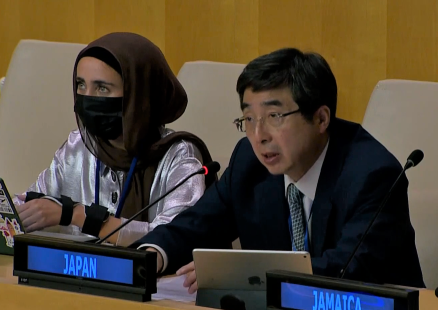ロシアのウクライナ侵攻の帰結としての文化遺産の破壊に関する安保理アリア・フォーミュラ会合における石兼公博大使ステートメント
令和4年7月15日

(As delivered)
Mr. Chair,
I thank Albania, Poland and Ukraine for their leadership in organizing this important meeting. We are greatly concerned about the serious threat to cultural heritages posed by Russia’s aggression against Ukraine, endangering the protection and preservation of cultural heritage. [That is why Japan joined the co-organizers for today’s event.]
Mr. Chair,
The UNESCO 1954 Hague Convention stipulates that damage to cultural property belonging to any people whatsoever means damage to the cultural heritage of all mankind, and the High Contracting Parties must refrain from directing any act of hostility at the cultural property.
A series of reports of the damages incurred by Russia’s attack on the city of Kharkiv, a UNESCO Creative City for Music, on the historic centre of Chernihiv, which is on Ukraine’s World Heritage Tentative List, as well as on the Babyn Yar Holocaust memorial, is deeply concerning. We request UNESCO to continue working with the Ukrainian authorities to monitor the situation and report these damages in order to bring them to the world’s attention and for its action.
We thank UNESCO for offering its support and guidance to the Ukrainian authorities to mark key historic monuments and sites across Ukraine with the Blue Shield showing the distinctive emblem of the 1954 Hague Convention in order to prevent further attacks.
In order to further support the country’s effort to preserve its cultural heritage and properties, Japan provided 500,000 US Dollars to UNESCO to support satellite monitoring of the damage for priority sites, which are endangered or already impacted.
Mr. Chair,
In conclusion, I reiterate that any damage to the cultural heritage of mankind is intolerable, and all the more so when such a damage is incurred by an indiscriminate attack. The rights of civilians provided by the international humanitarian law must be protected, and in this context, Japan urges Russia to stop its aggression and comply with its obligation according to Article 4 of the 1954 Convention to refrain from any act of hostility directed against cultural property.
I thank you.
I thank Albania, Poland and Ukraine for their leadership in organizing this important meeting. We are greatly concerned about the serious threat to cultural heritages posed by Russia’s aggression against Ukraine, endangering the protection and preservation of cultural heritage. [That is why Japan joined the co-organizers for today’s event.]
Mr. Chair,
The UNESCO 1954 Hague Convention stipulates that damage to cultural property belonging to any people whatsoever means damage to the cultural heritage of all mankind, and the High Contracting Parties must refrain from directing any act of hostility at the cultural property.
A series of reports of the damages incurred by Russia’s attack on the city of Kharkiv, a UNESCO Creative City for Music, on the historic centre of Chernihiv, which is on Ukraine’s World Heritage Tentative List, as well as on the Babyn Yar Holocaust memorial, is deeply concerning. We request UNESCO to continue working with the Ukrainian authorities to monitor the situation and report these damages in order to bring them to the world’s attention and for its action.
We thank UNESCO for offering its support and guidance to the Ukrainian authorities to mark key historic monuments and sites across Ukraine with the Blue Shield showing the distinctive emblem of the 1954 Hague Convention in order to prevent further attacks.
In order to further support the country’s effort to preserve its cultural heritage and properties, Japan provided 500,000 US Dollars to UNESCO to support satellite monitoring of the damage for priority sites, which are endangered or already impacted.
Mr. Chair,
In conclusion, I reiterate that any damage to the cultural heritage of mankind is intolerable, and all the more so when such a damage is incurred by an indiscriminate attack. The rights of civilians provided by the international humanitarian law must be protected, and in this context, Japan urges Russia to stop its aggression and comply with its obligation according to Article 4 of the 1954 Convention to refrain from any act of hostility directed against cultural property.
I thank you.
